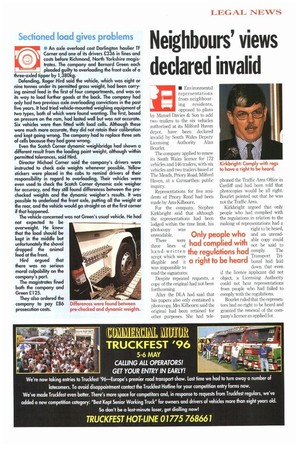Sectioned load gives problems
Page 19

If you've noticed an error in this article please click here to report it so we can fix it.
IF An axle overload cost Darlington haulier TF Corner and one of its drivers £336 in fines and costs before Richmond, North Yorkshire magistrates. The company and Bernard Green each pleaded guilty to overloading the front axle of a three-axled tipper by 1,380kg,
Defending, Roger Hird said the vehicle, which was eight or nine tonnes under its permitted gross weight, had been carrying animal feed in the first of four compartments, and was on its way to load further goods at the back. The company had only had two previous axle overloading convictions in the past five years. It had tried vehicle-mounted weighing equipment of two types, both of which were found wanting. The first, based on pressure on the ram, had lasted well but was not accurate. Six vehicles were then fitted with load cells. Although these were much more accurate, they did not retain their calibration and kept going wrong. The company had to replace three sets of cells because they had gone wrong. Even the Scotch Corner dynamic weighbridge had shown a different result from the loading point weight, although within permitted tolerances, said Hird.
Director Michael Corner said the company's drivers were instructed to check axle weights whenever possible. Yellow stickers were placed in the cabs to remind drivers of their responsibility in regard to overloading. Their vehicles were even used to check the Scotch Corner dynamic axle weigher for accuracy, and they still found differences between the prechecked weights and the dynamic weigher's results. It was possible to underload the front axle, putting all the weight at the rear, and the vehicle would go straight on at the first corner if that happened.
Hird argued that there was no serious moral culpability on the company's part.
The magistrates fined both the company and Green £125.
They also ordered the company to pay £86 prosecution costs.




























































































































